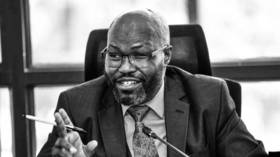Patriot Act prolongation prompts privacy debate

The US Congress is trying to renew the Patriot Act, which allows law enforcement agencies to search telephone and email records, which they insist is necessary to defend the public from the threat of terrorism.
Brought in by the Bush White House as an emergency 9/11 anti-terror measure, the Patriot Act gives sweeping powers to the US authorities to spy on people – which critics say infringes civil liberties. Now that the major provisions of the Act are about to expire, the US Senate’s Judiciary Committee is in a real hurry to rubberstamp the extension of the Act rather than discuss and debate the far-reaching measures. As the US Senator Dianne Feinstein of California put it “They expire in three weeks and I think there’s no time really to go into the changes.”There was ‘no time’ either for real debate back in 2001, when the Patriot Act was adopted weeks after the 9/11 attacks.According to Congressman Dennis J. Kucinich of Ohio, the lawmakers had not even read what they were passing. “What happened once the Patriot Act was passed, the Fourth Amendment right – to be protected from unreasonable searching was just thrown out.”The Congressman was one of the very few who openly opposed the Act. “We have a challenge to the essence of democracy with the very existence of the Patriot Act,” Denis Kucinich warns. “And of course its name – the Patriot Act – who would want to oppose the Patriot Act, because it makes it sound as though you’re a patriot if you are for it. But actually the idea of tying patriotism to the destruction of cherished constitutional privileges needs in itself to be challenged.”Although lawmakers insisted that the Patriot Act would be used just for anti-terrorism, federal authorities have used its powers far more broadly. The Senate’s intelligence watchdog found that without any judicial checks, government employees, journalists, anti-war activists and others had been spied on.
Over the last six months more than 20 anti-war activists around the country have been subpoenaed, after the FBI raided homes in Chicago and Minneapolis, reportedly using the Patriot Act powers to round-up American citizens. “There’s ample reason to believe that when you create massive databases of politically potentially very useful information about both innocent and guilty people, eventually someone with access will misuse it. We see it all the time, how people who become politically engaged or political threatening are subject to disclosure of sensitive information about them,” shared Julian Sanchez from the CATO Institute, in Washington DC. The Patriot Act allows security services to lawfully spy by wire-tapping large groups of phone numbers and monitoring e-mail addresses in bulk, instead of needing a warrant each time. The National Security Agency have even intercepted Bill Clinton’s private emails – later said to be an inadvertent mistake – among millions of other pieces of correspondence snooped on. A privacy watchdog suggests that since 2001, the FBI’s intelligence investigations have compromised the civil liberties of American citizens far more frequently, and to a greater extent, than was previously assumed. Supporters of the Act say it Is needed because of the terrorist threat. One of them, James Carafano from the Heritage Foundation states that “We’ve had 36 thwarted attacks since 9/11.”RT: Do you know for a fact that it was thanks to the Patriot Act that those attacks were prevented?JC: It’s difficult to say that for sure because when you look at court records and other documents available you can say in these cases there were cases where the Patriot Act-like tools were very useful so we can surmise and suspect that they were useful.”Congressman Kucinich says the Act is supported in Congress due to a climate of fear. “So we have a whole nation of fearful people. Promoting fear you cannot have a democracy if the democracy rests upon fear, you cannot walk in faith and freedom and fear at the same time.”Americans have a great deal of respect for their founding fathers. And one of those wise men, Benjamin Franklin, said “Those who would give up essential liberty to purchase a little temporary safety deserve neither liberty nor safety”. It seems that piece of advice is largely ignored by today’s America.













